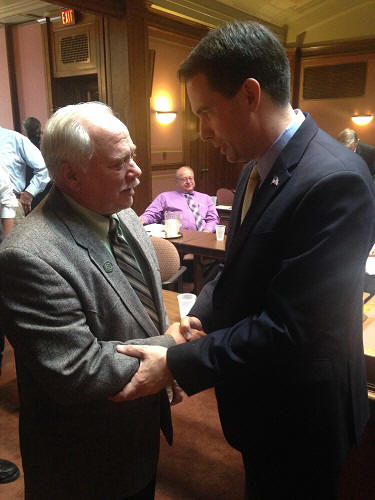Assembly
Session
The Assembly reconvened on
Thursday, September 24, to vote on bills that have been in the works
during the summer recess. I am happy to say that one of the bills the
Assembly passed was
Assembly Bill
217, a bill I introduced that will give the
Marriage and Family Therapy, Professional Counseling, and Social Work
Examining Board the authority to determine how many hours of experience
with the diagnosis and treatment of individuals a person must have in order
to be licensed as a clinical social worker. This bill came about in response to a
hearing the Assembly Committee on Family Law, which I chair, held earlier
this year.
The Assembly also passed a package of
bills that had been recommended by the
Legislative Council Study Committee on Adoption Disruption and Dissolution,
which was created to investigate why some adoptions are unsuccessful and how
the state can help prevent such situations, which can take a serious toll on
the children's wellbeing. The committee's
report describes the meetings it held in 2014 and the four bills it
ultimately produced,
Assembly Bills
39, 40,
41, and
42.
In addition, the Assembly passed
Assembly Bill
253, which adds Wisconsin to the
Interstate Medical Licensure
Compact. The goal of the compact is to allow a doctor who has been
licensed in one participating state to obtain an "expedited" license in
another participating state if he or she chooses, without having to go
through onerous, unnecessarily duplicative application processes. This
will make it easier for doctors to move among states or to practice
"telemedicine" across state lines and may help to address Wisconsin's doctor
shortage, particularly in rural areas. The state will still have the
authority to regulate the practice of medicine.
Perhaps the most noteworthy bill the Assembly
passed on Thursday is
Assembly Bill
310, a bill I cosponsored that will require the Wisconsin Department of
Health Services (DHS) to apply for grant funds under Title X of the federal
Public Health Service Act. If DHS receives these funds, it must
distribute them to state and local health departments and clinics for the
purposes of family planning and related preventive health services, with any
excess funds being distributed for the same purposes to private hospitals or
health centers that meet certain criteria. A public entity that
receives the distribution (including DHS) may not further distribute the
funds to public or private entities that provide abortion services or have
affiliates that provide abortion services or referrals to abortion services.
Planned Parenthood is currently the only
entity that receives Wisconsin's Title X funding. AB 310
allows the state to apply for these funds directly and distribute the
funding to entities that do not provide or facilitate abortion services.
The federal government would still be able to
grant these funds to Planned Parenthood rather than the state if it chooses,
even if AB 310 becomes law, but I nevertheless believe it is important -
both from a pro-life perspective and from a desire to make sure county and
local health departments have the funding they need - to offer an
alternative.
These bills and other Assembly bills the
Assembly passed Thursday will be going to the Senate for further
consideration, and the Senate bills the Assembly concurred in will go to
Governor Walker for his approval.
Full Fun
It's that time of year again, and the
Wisconsin Department of Tourism has posted its
Fall Color Report,
so that you'll know when to visit your favorite area for admiring the
changing leaves. The department also has some
suggestions for scenic drives, if you're in the mood for a fall road
trip!

Governor Walker visited with Assembly Republicans before Thursday's floor
session
|

